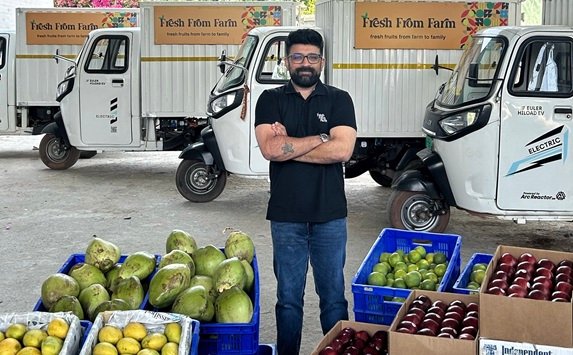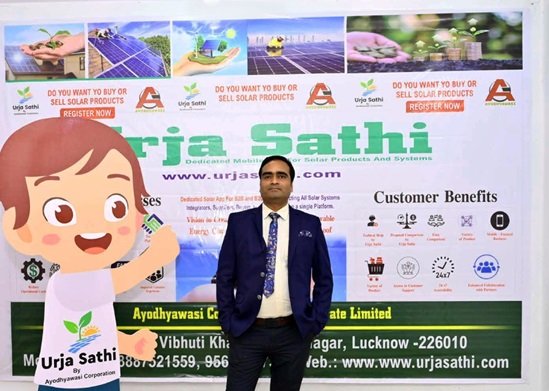Rohit Nagdewani, Founder, Fresh From Farm in an exclusive conversation with AgroSpectrum reveals F3’s future business strategies and expansion plan in six cities surrounding Delhi NCR region.
What is the current market size of fruit in India?
India ranks as the second-largest producer of fruits globally, just behind China, and is a leading producer of bananas, papayas, and mangoes. In 2023, India’s fruit production was estimated at 99.07 million tonnes, contributing significantly to the global annual production of 883 million tonnes.
The fruit market in India is substantial, with an estimated value of approximately $60 billion as of 2023. This market is experiencing robust growth, fuelled by increasing health awareness among consumers and rising disposable incomes. These trends are well-documented in reports from market research firms and industry publications, highlighting India’s critical role in the global fruit production landscape and its burgeoning domestic market.
How the technological innovations are driving the growth of this market?
Good Agricultural Practices (GAP), Good Manufacturing Practices (GMP), and Good Handling Practices (GHP) play a pivotal role in driving growth in the agricultural market, as highlighted in numerous industry guidelines and reports. These standards are essential for ensuring food safety, maintaining product quality, and promoting sustainability, particularly in the fruit market.
In addition to these practices, investments in storage and logistics infrastructure are critical for preserving product freshness, minimising waste, and enhancing market efficiency. The integration of Artificial Intelligence (AI) and Machine Learning (ML) further accelerates market growth by enabling precise resource management, accurate crop yield prediction, and early detection of disease outbreaks. These technologies optimise agricultural practices and support the industry’s sustainability goal. Also, improve production efficiency, reduce waste, enhance traceability, and extend the shelf life of fruits, contributing to the market’s continued expansion.
Why it is important to have a smooth supply chain in this business and how your company is able to maintain a healthy supply chain?
A seamless and efficient supply chain is crucial in the fruit industry, particularly because of the perishable nature of the products. Even a minor delay in the logistics process can lead to spoilage and significant financial losses. To mitigate this risk, we at Fresh From Farm have implemented a comprehensive strategy to maintain a robust and responsive supply chain through Integrating the advanced logistics software and direct fruit sourcing from farmers. Let’s discuss how it works: –
Integration of Advanced Logistics Software
We utilise cutting-edge logistics software that optimizes delivery routes and schedules, ensuring that transit times are minimized. This software takes into account real-time traffic conditions, weather patterns, and road networks, allowing for dynamic adjustments to transportation plans. By doing so, we reduce the overall time that fruits spend in transit, preserving their freshness and quality upon arrival.
Direct Sourcing from Farmers
One of our key strategies is direct sourcing from farmers, bypassing intermediaries and reducing the complexity of the supply chain. Traditionally, fruits used to pass through several middlemen, warehouses, and transportation hubs before reaching retailers in distant markets. Each transfer introduces a higher risk of damage and spoilage, and the longer the fruit remains in the supply chain, the greater the loss of freshness.
By working directly with farmers, we significantly reduce the number of exchanges that fruits go through. This shortened supply chain minimizes handling problems, prevents unnecessary delays, and ensures that fruits reach the market more quickly and in better condition. For example, mangoes sourced directly from southern Indian farms can travel thousands of kilometres with fewer handling stages, ensuring they arrive at retail destinations fresher and less susceptible to bruising or spoilage. This direct-to-market approach not only enhances the quality of produce reaching consumers but also allows farmers to receive better prices for their crops by cutting out intermediaries.
What are the major challenges in this business and what is the way forward?
The fruits sector in India faces several significant challenges that hold back the overall growth of agricultural development. One of the most critical issues is the high level of post-harvest losses and wastage, primarily due to inadequate handling, poor storage facilities, and inefficient supply chains. Perishable goods such as fruits are particularly vulnerable to spoilage if not handled or transported properly. These losses result in a substantial reduction in the income of farmers and contribute to food insecurity across the country.
India’s transportation infrastructure for agricultural goods remains a major challenge. Inadequate cold chain facilities, poor road networks in rural areas, and delays in transit can lead to significant quality degradation of fresh produce.
Fruits often have specific climate requirements for optimal growth, including precise temperature ranges, rainfall patterns, and seasonal timing. Changes in these factors—such as unseasonal rains, prolonged droughts, or extreme heat waves—can throw off the natural growth cycle of fruit crops.
Reducing fruit wastage during transportation requires strong government intervention through both technical and financial support. This can include investing in cold chain infrastructure, modernised transportation facilities, and advanced logistics systems. Additionally, financial assistance for farmers and transporters can help adopt these technologies, ensuring fresher produce reaches markets with minimal spoilage.
What are your expansion plans and how you are planning to execute them?
In the coming months, we aim to significantly expand our presence in the Delhi NCR region. Currently, we are making 450 to 500 deliveries per day, and our goal is to increase this to 1,500 to 2,000 deliveries daily within Delhi NCR alone. Following this expansion, we plan to extend our operations to nearby cities such as Jaipur, Chandigarh, and Jalandhar.
What are your expectations from the current government?
To enhance India’s fruit market potential, the government needs to focus on improving quality and safety practices in production and packaging. Key initiatives include:
Research and Development: Encouraging the use of tissue culture to produce high-quality, pathogen-free plants and developing fruit varieties with extended shelf life tailored for international markets.
Addressing the relatively low fruit productivity in India by implementing High-Density Plantation (HDP) techniques and conducting scientific assessments of nutrient and irrigation needs.
Post-Harvest Infrastructure: Expanding cold storage facilities, introducing advanced sorting, grading, and treatment processes, and encouraging investment in specialized transport and food inspection infrastructure.
Application of Digital Tools: Supporting the adoption of digital tools and IoT for precision agriculture to maximize yields and improve resource management.
International Trade: Advocating for the removal of trade barriers in Free Trade Agreement (FTA) negotiations to integrate India into the global fruit trade value chain.
By Nitin Konde
Rohit Nagdewani, Founder, Fresh From Farm in














